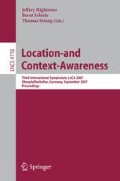Abstract
Adaptation of devices and applications based on contextual information has a great potential to enhance usability and mitigate the increasing complexity of mobile devices. An important topic in context-aware computing is to learn semantic locations and routes of mobile device users. Several batch methods have been proposed to learn these locations. However, such offline methods have very limited usefulness in practice. This paper describes an online adaptive approach to learn user’s semantic locations. The proposed method models user’s GPS data as a mixture of Gaussians, which is updated by an online estimation. The learned Gaussian mixture is then evaluated to determine which components most likely correspond to the important locations based on a priori probabilities. With learned semantic locations, we also propose a minimax criterion to discover user’s frequent transportation routes, which are modeled as sequences of GPS data. Finally, we describe an application of the proposed methods in a cell phone based automatic traffic advisory system.
Access this chapter
Tax calculation will be finalised at checkout
Purchases are for personal use only
Preview
Unable to display preview. Download preview PDF.
References
Dempster, A.P., Laird, N.M., Rubin, D.B.: Maximum likelihood form incomplete data via the EM algorithm. Journal of Royal Statistical Society, 1–38 (1977)
Ester, M., et al.: A Density-Based Algorithm for Discovering Clusters in Large Spatial Databases with Noise. In: Proc. of KDD (1996)
Hariharan, R., Toyama, K.: Project Lachesis: Parsing and Modeling Location Histories. In: Proc. of International Conference on Geographic Information Science (2004)
Horvitz, E., Jacobs, A., Hovel, D.: Attention-sensitive alerting. In: Proc. of UAI 1999 conference on Uncertainty in Artificial Intelligence, pp. 305–313. Stockholm, Sweden (1999)
Kang, J.H., Welbourne, W.: Extracting Places from Traces of Locations. In: Proc. WMASH (2004)
Krumm, J., Horvitz, E.: Predestination: Inferring Destinations from Partial Trajectories. In: Dourish, P., Friday, A. (eds.) UbiComp 2006. LNCS, vol. 4206, Springer, Heidelberg (2006)
Laasonen, K., et al.: Adaptive On-Device Location Recognition. In: Ferscha, A., Mattern, F. (eds.) PERVASIVE 2004. LNCS, vol. 3001, Springer, Heidelberg (2004)
Liao, L., et al.: Learning and Inferring Transportation Routines. In: Proc. of AAAI (2004)
Marmasse, N., Schmandt, C.: Location-aware information delivery with comMotion. In: Proc. of International Symposium on Handheld and Ubiquitous Computing, Bristol, UK, pp. 157–171 (September 2000)
Marmasse, N., Schmandt, C.: A User-Centered location model. Personal and Ubiquitous Computing 6(5-6), 318–332 (2002)
Marmasse, N., Schmandt, C., Spectre, D.: WatchMe: communication and awareness between members of a closely-knit group. In: Proc. of Ubicomp 2004: Ubiquitous Computing, 214–231 (2004)
Patterson, D.J., et al.: Inferring High-Level Behavior from Low-Level Sensors. In: Dey, A.K., Schmidt, A., McCarthy, J.F. (eds.) UbiComp 2003. LNCS, vol. 2864, Springer, Heidelberg (2003)
Priebe, C.E.: Adaptive mixtures. Journal of American statistical Association, 796–806 (1994)
Tang, J., Meng, L.: Learning significant locations from GPS data with time window. In: Proc. of SPIE, vol. 6418 (2006)
Titterington, D.M.: Recursive parameter estimation using incomplete data. Journal of Royal Statistical Society, 257–267 (1984)
Nurmi, P., Koolwaaij, J.: Identifying meaniful locations. In: Proc. of Third Annual International Conference on Mobile and Ubiquitous Systems: Networking & Services, pp. 1–8 (2006)
Ashbrook, D., Starner, T.: Using GPS to learn significant locations and predict movement across multiple users. Journal of Personal and Ubiquitous Computing 7(5), 275–286 (2004)
Zhou, C., Shekhar, S., Terveen, L.: Discovering personal paths from sparse GPS Traces. In: Proc. of 1st Internatioanl Workshop on Data Mining in conjunction with 8th Joint Conference on Information Sciences (2005)
Author information
Authors and Affiliations
Editor information
Rights and permissions
Copyright information
© 2007 Springer-Verlag Berlin Heidelberg
About this paper
Cite this paper
Zhang, K., Li, H., Torkkola, K., Gardner, M. (2007). Adaptive Learning of Semantic Locations and Routes. In: Hightower, J., Schiele, B., Strang, T. (eds) Location- and Context-Awareness. LoCA 2007. Lecture Notes in Computer Science, vol 4718. Springer, Berlin, Heidelberg. https://doi.org/10.1007/978-3-540-75160-1_12
Download citation
DOI: https://doi.org/10.1007/978-3-540-75160-1_12
Publisher Name: Springer, Berlin, Heidelberg
Print ISBN: 978-3-540-75159-5
Online ISBN: 978-3-540-75160-1
eBook Packages: Computer ScienceComputer Science (R0)

